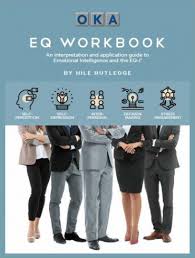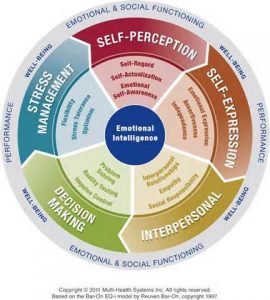The Group Defines Normal
Think about what EQ is or looks like. If someone has high Assertiveness, that means that they show more Assertiveness (expressed drive and opinions) than do critical mass of those around them. Low Empathy suggests that they show less concern for and curiosity about others’ needs and feelings than do most of the people around them. Emotional Intelligence is rooted in (and, indeed, is dependent upon) the comparison of one person’s behavior to that of the group around them.
What most people are doing becomes the norm, and the degree to which any of us deviates from this behavior is the degree to which we stand out. Standing out is neither good nor bad by itself. Sometimes deviating from the group can bring us great rewards and be to our (and the group’s) benefit. Other times deviating too far from the group’s expectations draws fire and proves a liability. In EQ terms, more often than not, under-utilizing an element of Emotional Intelligence brings more negative attention and exacts a higher toll than being within the cultural norm.
For instance, engaging in Interpersonal Relationships noticeably less often or well than most people around you leads to feedback and/or the perception that you are cold, distant and hard to get to know or trust. The “cost” of someone’s low engagement with Interpersonal Relationships, therefore, is disconnection and this negative feedback. So, can EQ change or be developed? The answer is, yes, but only when the cost or price of the current behavior is higher than the cost/price of the pain that comes with changing that behavior.
Small Behavioral Changes Produce Big EQ Results
The good news on the EQ-development front is that small, incremental changes in behavior can and usually do have big impacts in someone’s overall EQ and the way in which they show up in the world. Too often times, the question is framed around dramatic alterations—fundamental changes in manner or style, and these behavioral transformations are unlikely and should not be the goal. When possible, they are not generally sustainable. Can someone disengaged from Interpersonal Relationships become a poster-child example of relational engagement, trust and compassion? Likely not.

However, can someone who gets feedback about their active disregard of Interpersonal Relationships learn to exercise a few tools with a handful of people in their life so that what was an active detrimental force against them becomes a neutral force? In EQ-i assessment terms, can a score of 80, once worked on, become a score of 92, and thus shift from something that stands out for its scarcity to not standing out at all? The answer to this question is clearly, “yes.” A small behavioral change would make a big impact on perceived Emotional Intelligence.
Emotional Intelligence Drives Tactical Action
While EQ in general, and the EQ-i assessment specifically, paint big, rich, inclusive behavioral portraits, they also, ironically, call for work that is specific, tactical and immediately actionable. And it is in this micro-focused world of individual habits and behaviors and targeted audiences and relationships that successful EQ-development is done and where growth can be achieved, measured, and maintained.
For a deeper dive on Emotional Intelligence and its application, consider OKA’s EQ Workbook, by Hile Rutledge, 
and learn more about OKA’s EQ-i Certification classes.

OKA can also support your team or program with Emotional Intelligence workshops (online or onsite), 360 assessment programs and individual coaching.
Other Blogs in this Series
This blog is Part of a 7-part series of EQ surprises and tips. Below are links to the other titles in the series. Enjoy the exploration.
- EQ Surprise #1 — There is no Emotional Intelligence on a Desert Island
- EQ Surprise #2 – Forget Your Emotional Intelligence Scores
- EQ Surprise #3 – The EQ-i Shock Block
- EQ Surprise #4 – EQ Deficiencies are Hard to Work On
- EQ Surprise #5 – The Most Important EQ-i Elements are the Toughest to Move
- EQ Surprise #6 – You Can’t Dial Back and Overdone Strength

Leave a Comment